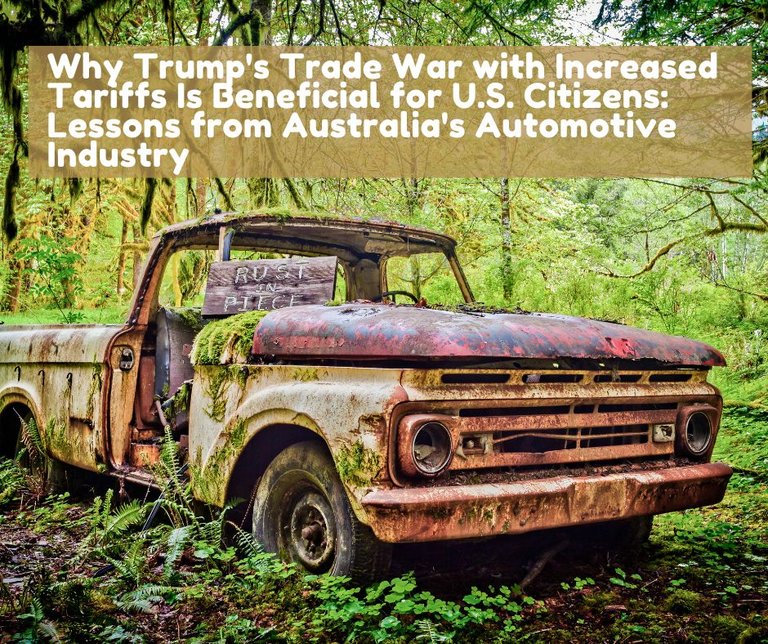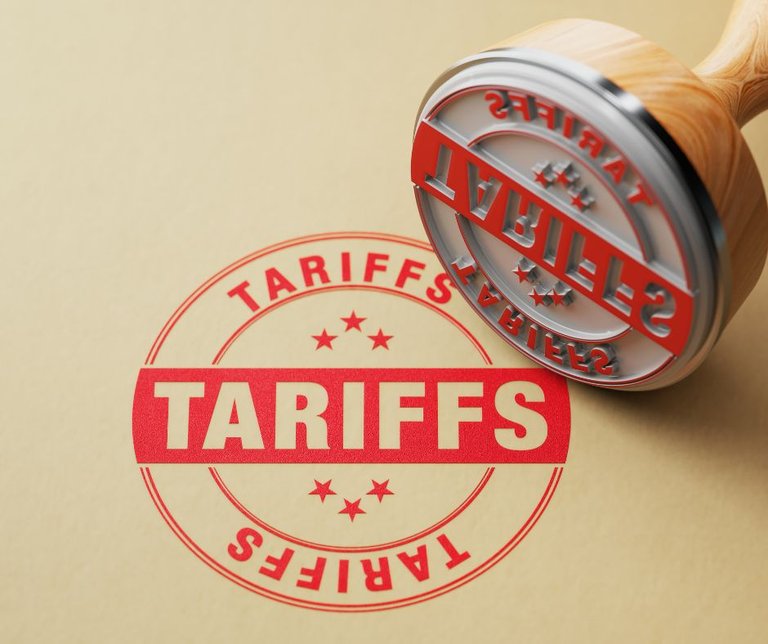
Why Trump's Trade War with Increased Tariffs Is Beneficial for U.S. Citizens: Lessons from Australia's Automotive Industry
Geopolitics has taken a drastic turn as politician's across the globe commence behaving as school children with chants of "I know I am, So What Are You" when it comes to their response of POTUS Tariffs and their return serve applying the same tariffs on the United States.
But is this a bad thing? Globalisation has taken hold and crept into our lives since the 80s and for many if you remember those years or even pre it was a time of high employment, wage growth local manufacturing the need for only one wage, low housing costs and so much more.
Then globalisation took hold Tariff's removed and manufacturing went to Taiwan, China and other nations where for a fraction of the cost things could be made. Unfortunately a large cohort is just plastic crap leading to more micro plastics, more CO2 emissions and more financial waste. Not to mention we are now in a period where corporate profits are at an all time high but wage growth is at an all time low.
Tariff's or often scoffed at and seen as a negative that slows the economy but that isn't entirely true and for the working class's of the world we have recent proof on how Tariffs are actually a good thing.
![]()
Australian Car Manufacturing Collapse
Australia was home to one of the biggest car rivalry on the planet, the good old Holden or Ford. They weren't just cars they were cults and part of our national identity and economy. The industry provided tens of thousands of jobs both directly in manufacturing plants and indirectly through supply chains, dealerships and related services.
However, it all began to unravel when the Liberal National Party of Australia pursued aggressive trade liberalization policies under "Free Market" Principles. The removal of protective tariffs opened the floodgates to cheaper, imported vehicles particularly from Japan. Japanese automakers like Toyota, Honda and Nissan rapidly gained market share offering cars that were often more affordable and fuel efficient than Australian made. So in other words bye bye V8's and high performance vehicles that Australian's came to love.
The consequences were and still are destructive because without the protective buffer of tariffs, Holden and Ford struggled to compete against the influx of cheap Japanese vehicles. Production costs in Australia that consisted of liveable wages and stringent safety regulations made it nearly impossible to match the prices of imported cars.
Both Holden and Ford ceased local manufacturing leading to the loss of tens of thousands of jobs and the collapse of a once vibrant industry. We were told that we would have cheaper cars, but this is not the case as once Holden and Ford were gone imports jacked up their prices to pretty much the same price as an Australian manufactured car. This is where the corporation profits blew up and this can be seen on many items.
Once local competition is smashed and the corporations hold the market they have a bench mark on what people will pay so just over price everything.

Trump's Game Changing Tariffs
President Trump's trade war which people are calling it due to increased tariffs on imported goods is being criticized for its short term economic disruptions. However, when comparing it to what has happened in Australia's automotive industry. These tariffs emerge as a strategic mechanism designed to protect American industries from similar fates and bring down corporate profits by:.
Protecting Domestic Jobs
Tariffs create a level playing field for domestic manufacturers by making imported goods less price competitive as western nations have higher living standards and workplace protections which are often complained about by business. Without such protections, industries risk outsourcing to countries with lower production costs and unsafe practices leading to job losses similar to what Australia experienced and the use of slave and child labor.
Encouraging Domestic Investment
By imposing tariffs the U.S. government is providing a commitment to supporting domestic industries. Creating an economy where companies are more likely to invest in local manufacturing facilities, research and development and workforce training. This leads to long term economic growth and tech innovation.
Reducing Dependency on Foreign Markets
The global COVID-19 pandemic proved without doubt the vulnerabilities of relying heavily on international supply chains as nations battled over who got what first and many went into waiting ques impacted the lives of people. Tariffs encourage the development of domestic supply chains and supporting national security and economic resilience. This self reliance ensures that critical industries remain robust even during global disruptions.

Learn From Australia and Don't Be A Muppet
There is always a cost to unrestricted trade and we have been paying for it with increased global profits, high interest rates, job losses and wipe out of local manufacturing sector due to cheap imports.
Australia's experience proves the risks of unrestricted free trade without protections. The dismantling of tariffs have led to:
Massive Job Losses: The closure of automotive plants resulted in tens of thousands of job losses not only in manufacturing but also in related sectors such as parts suppliers, logistics and dealerships striking at the core of working class Australian's.
Economic Decline in Manufacturing Regions: Communities that were once vibrant manufacturing hubs have seen economic decline and increased unemployment. With increased social challenges including crime and youth problems.
Loss of Industrial Capability: Once an industry collapses rebuilding it is near impossible and costs governments way more and is all but impossible. Australia lost a critical industrial which will have impacts on our military, health and all sectors as they all rely on the ability to locally manufacture items. Throwing rainbows at M16s don't work unfortunately so nations need to rely on their manufacturing sectors.
Well done America, you're changing the global market for the better.
image sources provided supplemented by Canva Pro Susbcription. This is not financial advice and readers are advised to undertake their own research or seek professional financial services
Posted Using INLEO
The difference is, that’s assuming there is an industry left to protect.
For example, if you need to put 100% tariff on Chinese EVs just so Tesla and other companies can compete, things must look pretty dire.
I’m doubting American “entrepreneurs” resolve to invest back into their own country than just cut jobs and wait Trump out.
Not to mention, I doubt most Americans would be okay to persevere 10-15 years to “reshore” those outsourced industries.
100% agree and I touch on it in the article and the impacts it has had on Australia especially when COVID hit and we had a lack of manufacturing skills which saw the military brought in to manufacture
Thank you for your witness vote!
Have a !BEER on me!
To Opt-Out of my witness beer program just comment STOP below
The emissions scam did not help much either, I could take that old truck in the picture, slap an air pump and converter on it, and make it blow zeros.The new computerized fuel systems do work better and are more efficient but nobody can work on their cars anymore.
Indeed, but even with it we needed the manufacturing for next gen car manufacturing. Asia can not continue to be the world manufacturing centre especially in the current political climate.
Of course this is a good thing in the long run but in the short run we saw the bloodbath in the markets. It is difficult to change the way investors and users think overnight.
There will be pushback from corps but it is what it is overall a massive benefit